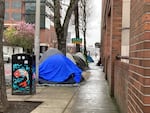
Tents line the entirety of some city blocks in Portland's Old Town on March 23, 2022.
Julie Sabatier / OPB
With fewer sweeps during the pandemic, encampments have become a seemingly permanent fixture in many parts of Portland. And in response, city officials have started taking a more hardline approach. In February, Mayor Ted Wheeler issued an emergency order to ban camping near busy roadways. He has also said he plans to create large outdoor sites for sanctioned camping.
OPB’s “Think Out Loud®” has heard from service providers, policy makers, and elected officials, including the mayor. We also wanted to hear from people who are living on the streets. So, on a chilly and rainy March day, a team of journalists went out to conduct interviews with folks living in tents or shelters or cars. This wasn’t comprehensive, or scientific. It’s a snapshot of homelessness on one spring day in Portland.
Old Town is arguably the epicenter of homelessness in the city. On the day we went, tents lined the entirety of some blocks. There was trash everywhere. We had to watch where we were walking so we didn’t step on human waste or hypodermic needles.
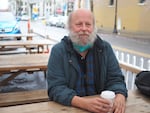
Douglas Marcks, who also goes by "Wookiee" enjoys a cup of coffee near the Street Roots office in downtown Portland on March 23, 2022.
Dave Miller / OPB
Outside the Street Roots office on Northwest Davis Street, some people were hanging out at the outdoor seating area for CC Slaughters, the bar next door. Douglas Marcks, also known as “Wookiee,” was one of them.
“There’s way too many drugs on the street. There’s way too many shootings on the street,” he said. “I had shots right behind my tent.”
Marcks compared the proposed idea of large, outdoor encampments to “concentration camps.” He’s not the only person to make that comparison, and the idea has gotten a lot of pushback from city officials and community groups. Many people have been offended that places with food and hygiene and social services are being compared to death camps, where millions of people were killed.
When asked what he’s seen change recently, Marcks said, “It’s gotten worse, by far.”
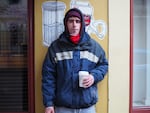
Nick McMann says he's been in Portland for about 10 years. He's originally from Seattle.
Dave Miller / OPB
Nick McMann was standing nearby. He seemed to have trouble keeping his eyes open as he spoke. He said he’s originally from Seattle and has been in Portland for about 10 years.
“I’m pretty much sleeping on the streets of Portland with the very rare exception that I get into a mission around here for a night. The majority of my time is spent in a wet sleeping bag in some kind of makeshift shelter that I put together every night,” he said.
McMann added that he thinks easier access to tents would be helpful to a lot of people in his situation and that he would like to live in a large tent city with resources for people in recovery.
“I’m currently enrolled in a methadone clinic. So, I’m trying to quit using heroin altogether, and other drugs,” he said. “Hopefully, one of these days, I’ll just have a normal life.”
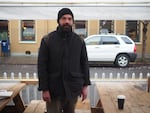
Daniel Toole is homeless and he says he's frustrated by the lack of resources for people experiencing mental health challenges.
Dave Miller / OPB
Daniel Toole said he thinks about homelessness a lot and he often gets frustrated with what he sees as a lack of willpower on the part of city officials who could be working towards solutions. He disclosed that he struggles with his own mental health and he’s upset when he hears people say things like, “Just get a job.”
“That’s rough to get a job when you don’t have anywhere to shower, you don’t have clothes to change into, you don’t have ID, you can’t get your Social Security card, you can’t get your birth certificate, can’t buy a phone,” he explained. “There’s so many barriers.”
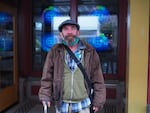
Keith McEntire, who also goes by "Max," is originally from Amarillo, Texas. He says he's lived in Portland on and off since 1986.
Dave Miller / OPB
Keith McEntire says everyone on the street calls him “Max.” He’s originally from Amarillo, Texas, and has lived in Portland off and on since 1986. He’s living in a tent on Burnside right now. He said what would be most helpful to him is access to a vehicle so that he could do labor work on farms and ranches as the weather warms up.
“If I had transportation to get around, then I wouldn’t be walking down the highway,” he explained. “For instance, I have a job in Yakima I have to be at on the 30th and I have to find a way of getting there.”
McEntire said he doesn’t like the idea of large, city-sanctioned encampments at all and would consider leading a protest against the proposal. He also made a comparison to concentration camps. But there are some people he thinks should be forced into large tent cities.
“These people who are all doped out like that? Take them out there and dry ‘em out,” he said. “You want the dope problem to stop, you want the violence problem to stop, dry ‘em out!”
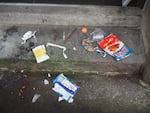
Trash and hypodermic needles were ubiquitous in central Northwest Portland on March 23, 2022.
Dave Miller / OPB
Glenna Williams was around the corner from Blanchet House, where she often comes for meals. She said she’s originally from Seattle, and she’s been in Portland for about a decade.
“I’m in a shelter, but I don’t know how long it’s gonna last. They may close it, but they may move it to another place. I don’t know,” she said. “There’s absolutely no shelters for women.”
Williams said she feels fortunate to have a spot in a shelter and she would like to see more low-income housing available to people like her. She did not want to have her picture taken.
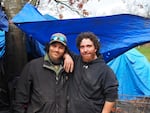
Mark Paddock (left) and Christian St. Peter had tents set up near Delta Park in North Portland on March 23, 2022.
Dave Miller / OPB
Mark Paddock and Christian St. Peter are camping in an area near Delta Park, in North Portland. It’s a grassy and muddy gully along a busy road with a lot of truck traffic. The area had tents, abandoned campsites, trash and some stripped down cars.
St. Peter said he’s originally from Reno and came to Portland two years ago to be near his family. On an average day, he says he tries to keep his campsite clean and “stay out of everybody’s way.” The night before, as he was waiting for his wife to come home from work, he said one of his tents caught on fire. He thinks someone set the fire on purpose.
“You can definitely tell because people have been doing that to everybody lately and it’s just becoming ridiculous,” he said. “They think that being homeless is a big joke or something like that but it’s not. For some of us, it’s a way of life because we don’t want to live under the thumb of the government.”
St. Peter said that he’s spent time in jail and, because of that, an apartment with four walls feels too constricting.
Asked what he wants from city officials, he said, “Honestly, I wish that they would give us a piece of land that we can do whatever we need to, maybe build up or build some houses or whatever and just let us do our thing. And if they need to, they can swing by and make sure everything’s going OK, make sure that we’re not doing stupid stuff.”
Paddock and St. Peter live together with their wives. Paddock said the tents often flood when the rain gets heavy.
“Pretty soon, we’re going to be lifting our tents up off the ground,” Paddock explained. “We’re going to get a bunch of pallets to put underneath our tent.”
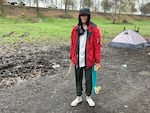
"They call me 'Moth' out here," says a young man with a skateboard traveling near Delta Park in North Portland on March 23, 2022. He was with his fiancée, Amber Watier.
Dave Miller / OPB
A guy who goes by “Moth” was skateboarding on the busy road nearby. He said he doesn’t like the idea of large encampments sanctioned by the city, which he compared to “herding us all together like (expletive) cattle.”
His fiancée, Amber Watier, was walking along the road behind him. She said she grew up in “deep Gresham” and spent time in foster care before her mom got custody of her and her siblings again. She described it as “a really easy childhood.” Now, Watier is homeless. She says it’s been that way since she was 15 or 16, when she chose to run away from a foster home.
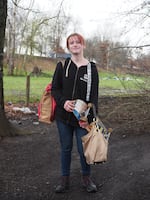
Amber Watier grew up in Portland and Gresham. She says she's been homless for more than a decade, since she was 16 years old.
Dave Miller / OPB
“I don’t really stay in one in particular spot,” she said when asked where she lives. “Wherever I decide to lay my head at night is where I call home that day.”
Watier said she is addicted to meth and opiates.
“Personally, my habits are not as detrimental as some other addictions can be, like alcohol,” she said. “I’m open about my addictions. It keeps me out of trouble.”
She said she’d love to be able to have her own apartment and a job and not be judged for her addiction issue.
On this one particular spring day in Portland, the people living outside who spoke to the “Think Out Loud” team had no clear consensus about the best way to address homelessness in Portland ... much like the city government.
To listen to our conversations with people experiencing homelessness, click the “play” button at the top of the page.